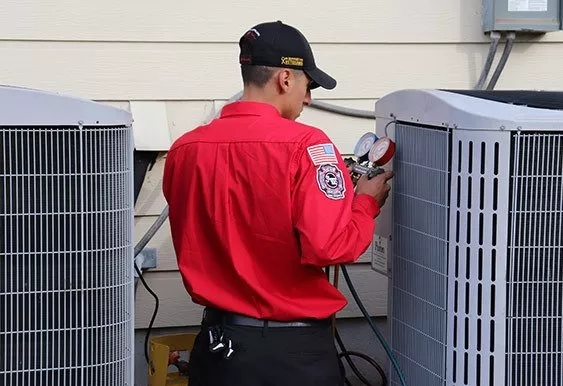Can I Run My Air Conditioner During a Storm?

In most cases, it’s safe to run your air conditioner during a storm. However, you need to take some precautions to ensure your system’s safety, especially if it’s a severe storm with a lot of lightning, torrential rains, or high winds. Understanding when it’s safe to run your AC and when it’s better to turn it off temporarily can help you protect your system and ensure you stay comfortable.
Can air conditioning run during a storm? This guide discusses:
- Risks of running your air conditioner during a storm
- How storms can impact your AC system
- Safety measures to protect your AC during a storm
- Alternatives to running your AC during a storm
- Maintaining your AC system post-storm
Keep reading to learn more about the risks of running your air conditioner during a storm and how you can protect your system.
Stay Cool Safely — Book an AC Inspection With Jon Wayne Today!
If your AC unit has been damaged by a power surge or storm debris, call the pros at Jon Wayne for prompt, reliable service.
Risks of Running Your Air Conditioner During a Storm
Running your air conditioner during a storm can increase the risk of:
- Power surges: If your unit gets struck by lightning, it can cause electrical disruptions that can damage the unit.
- Water damage: Heavy rains can infiltrate the AC unit and potentially affect electrical parts, causing internal damage.
- Debris impact: High winds can knock down tree limbs and cause other debris to hit the unit and cause damage.
How Storms Can Impact Your AC System
If your AC unit is affected by a strong storm, it could cause the following:
- Short circuits: If rain or other moisture comes into contact with electrical components, it can cause the unit to short circuit.
- Condenser coil damage: The condenser coils on the AC unit can be damaged if they’re struck by a heavy object, such as a tree limb, or become clogged with storm debris.
- Compressor strain: Power fluctuations from storm-related electrical issues can cause the AC compressor to be overworked, resulting in more wear and tear on the unit and potentially leading to costly repairs.
Safety Measures to Protect Your AC During a Storm
In most cases, with normal storms, keeping your AC running is fine. If you’re expecting strong storms or want to take extra precautions, these tips can help you minimize the risk of damage:
- Install a surge protector: A surge protector prevents damage to your unit from electrical spikes during a storm or other events, such as a downed power line.
- Use an AC cover: Covering your AC unit temporarily can keep out rain and other potentially harmful debris. A cover should only be used when the system is off and only for short periods of time, as it can turn your AC unit into an attractive shelter for rodents and other pests.
- Turn off the AC: If you know a severe storm is coming, temporarily shutting off the AC can protect the unit.
- Secure loose items: Avoid potentially costly damage to the AC unit from storm debris by tying down loose objects, such as outdoor furniture or trampolines, that can be swept away in high winds.
Alternatives to Running Your AC During a Storm
If you decide to turn your AC unit off, these alternative cooling methods can help you stay comfortable while you ride out the storm:
- Turn on ceiling fans and use box fans to circulate the air and reduce humidity. Putting a bowl of ice in front of a fan can turn it into a DIY AC.
- Close blinds and curtains to block the heat from any sunlight peeking through the clouds.
- Use portable air conditioners or dehumidifiers to provide temporary relief during the storm.
Maintaining Your AC System Post-Storm
Once the storm has passed, it’s important to check your AC unit for any damage:
- Check for visible damage or debris around the unit. Look for any dents, scratches, or debris lying near the unit that could indicate it was struck.
- Ensure the system is fully dry before restarting. Depending on the amount of rain and ongoing weather conditions, it can take anywhere from a few hours to a day or more to dry out.
- Schedule a professional inspection to assess any hidden issues. It’s a good idea to have a technician come out and check your unit after a severe storm or any time you think there may be something wrong.
Regular inspections and maintenance can ensure you catch small issues before they cause long-term damage and extend the lifespan of your system.
Protect Your Comfort — Contact Jon Wayne for Expert AC Advice!
If strong storms recently moved through your area, schedule a cooling inspection or repair with Jon Wayne — 100% satisfaction guaranteed.
